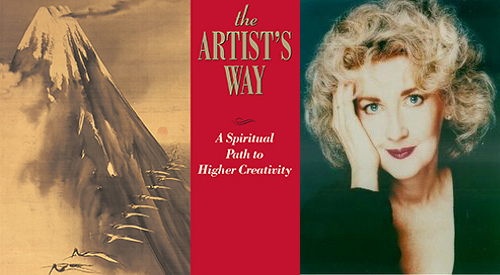An Artist’s Date with Julia Cameron

Julia Cameron was a successful screenwriter by her late twenties, but she realized she was writing with the pains of her ego instead of the lightness of her soul. She went through a process of “creative recovery” that she’s now shared with millions of people through such books as The Artist’s Way and her website Julia Cameron Live .
Cameron’s approach to writing mirrors NaNoWriMo’s framework in many ways. She discusses banishing “the Censor,” jumping into the mess of writing instead of honoring the judgments of perfectionism, and inviting in creative whimsy to nurture the artist’s soul. We interviewed her for some ideas on how to get the creative juices flowing before NaNoWriMo. For more NaNo Prep ideas, you can track #nanoprep on Twitter, read the NaNo Prep tag on this blog, and visit our site here.
Tell us about your writing career. How did you decide to become a writer, and where has it led you?
I have always been a writer. I started in sixth grade, writing a story to woo classmate Peter Mundy. By the time I was eighteen, I was writing regularly. I wrote in many different genres—short stories, novels, poetry, and journalism—I wrote anything and everything.
You’ve worked with a lot of people in your workshops. What’s the most frequent creative problem people have?
I believe people have difficulty starting on projects. Morning Pages help them to stop procrastinating. They miniaturize their “Censor” and allow them to work more freely.
What are “morning pages”?
Morning Pages are three pages of longhand morning writing. They are strictly stream-of-consciousness—there is no wrong way to do them. Because of this, they miniaturize the Censor, allowing you to move more freely to the page.
It’s as if you are building a spiritual radio kit. With Morning Pages, you are “sending”—notifying the Universe of what you like and what you dislike. Morning Pages provoke, clarify, comfort, cajole, prioritize, and synchronize the day at hand. They help you to discover artistic confidence and productivity.
Why not evening pages?
If you write pages in the evening, you are reviewing a day that you are powerless to change. Morning Pages lay out a sort of golden track for your day. They keep you from being hijacked by other people’s agendas.
Miniaturizing your Censor is akin to our notion of banishing your “inner editor.” Why do you think a willingness to do something badly is a good starting point for creators?
When we are willing to write “badly,” it frees us to write at all. Taking an attitude of experimentation banishes the perfectionist.
Can you tell us about your own creative recovery?
Up until age twenty-nine, I wrote from ego. At twenty-nine, I got sober and realized I needed a new way to write. I tried letting a Higher Power “write through me”—I listened and wrote what I heard. My writing improved dramatically. I came to believe that writing was a spiritual practice.
The notion of the tortured artist is so prevalent in our culture, but you view the artist as a compassionate, loving being. Why is your take different?
I believe our society has a toxic view of artists. We believe artists are drunk, crazy, broke, irresponsible, loners, promiscuous, doomed, unhappy, born, not made. I believe something quite different. I believe artists can be sober, sane, solvent, responsible, user-friendly, faithful, saved, happy, discovered, and recovered.
You advise people to go on weekly “artist’s dates”—time to nurture one’s creative consciousness. What are some of your favorite artist’s dates?
I now live in Santa Fe, where we have something called Canyon Road. It harbors more than a hundred galleries. They are provocative. When I lived in New York, my favorite Artist Date was a visit to the American Museum of Natural History. There, they had dioramas. These featured animals in their natural habitats. I loved them.
Do you have a favorite writing beverage?
I drink cold coffee.
Have you ever participated in National Novel Writing Month?
I’ve never participated in National Novel Writing Month, but I have written a novel in a month. I wrote my novel Mozart’s Ghost while on book tour.
Have you ever written a story about an animal that talked? A pirate? A dragon?
No. All of these remain to be explored.
What is the one tip you would give to first-time NaNo novelists?
Try writing Morning Pages.
Have any of you tried writing first thing in the morning? What is your typical writing schedule?
Chris Baty's Blog
- Chris Baty's profile
- 63 followers



